While ADHD can affect both children and adults, it is an illness primarily diagnosed in childhood, with the average age of a first-time diagnosis at 7 years old. The Center for Disease Control reports that 6.1 million children have been diagnosed with ADHD in the U.S. Here are some other trends:
Gender: Boys are more likely to be diagnosed with ADHD than girls. Adult men are also more likely to be diagnosed.
Race: From 2015-2016, ADHD was most prevalent among non-Hispanic Black children(12.8%) and non-Hispanic white children (12%).
Scientists are still doing work to understand the exact cause of ADHD. However, some risk factors can be:
Family history: Having blood relatives with ADHD or another mental health disorder
Environment: Toxins, including lead, may play a role
In utero: Mother’s who used drugs, alcohol, or smoked while pregnant
Premature birth
Symptoms of ADHD can be broken down into two categories: inattention and hyperactivity/impulsivity. Inattention can look like:
Careless mistakes and lack of attention to details
Trouble focusing
Trouble listening
Trouble following directions
Difficulty with organization
Aversion to activities that require focus (like homework)
Easily distracted
Misplacing items frequently
Frequently forgetting to do tasks
Signs of hyperactivity and impulsivity can include:
Frequent fidgeting
Difficult staying still or seated
Trouble playing quietly
Excessive talking
Blurting out answers
Difficulty waiting for their turn
Frequently interrupting others
Primary Care Physician (or Pediatrician): Your general doctor can help diagnose and treat ADHD. They might also refer you to a psychiatrist.
Psychiatrist: Psychiatrists specialize in treating mental health conditions, including ADHD.
Diagnosing ADHD can be difficult, especially in young children, since certain symptoms might overlap with typical development. Some symptoms can also appear like ADHD, when the true cause is some other physical or mental health factor. Your doctor will likely try to rule out other causes and collect as much behavioral information as possible, which may include interviews and questionnaires with teachers, relatives, caregivers, etc.
There are two main categories of prescription treatments for ADHD: stimulant medications and non-stimulant medications. Stimulant medications include:
Amphetamines: dextroamphetamine (Dexedrine), dextroamphetamine-amphetamine (Adderall XR, Mydayis), lisdexamfetamine (Vyvanse)
Methylphenidates: methylphenidate (Concerta, Ritalin, etc), dexmethylphenidate (Focalin)
Non-stimulant medications include:
Pharmacist Tip
When using stimulant medications for ADHD such as Adderall, keep in mind a few important points.
These types of medications may cause high blood pressure so make sure you’re regularly checking your blood pressure and heart rate as the doctor has told you.
Speak with your pharmacist or doctor before you take any over-the-counter medications as some may raise blood pressure such as cough or cold drugs, diet pills, stimulants, NSAIDs such as ibuprofen or naproxen, and some natural products or aids.
Do not take antacids with these types of medications.
Try to avoid drinking alcohol with some products. Ask your pharmacist or doctor to see if you need to avoid drinking alcohol with the medication you’re taking.
Especially for children, there are some lifestyle techniques you can use to help with ADHD symptoms and consequences. Some tips include:
Maintaining a regular schedule
Healthy habits such as regular sleep and a balanced diet
Practice organization skills, such as keeping an activities notebook to organize homework
Maintain a quiet study area that encourages focus during homework time

